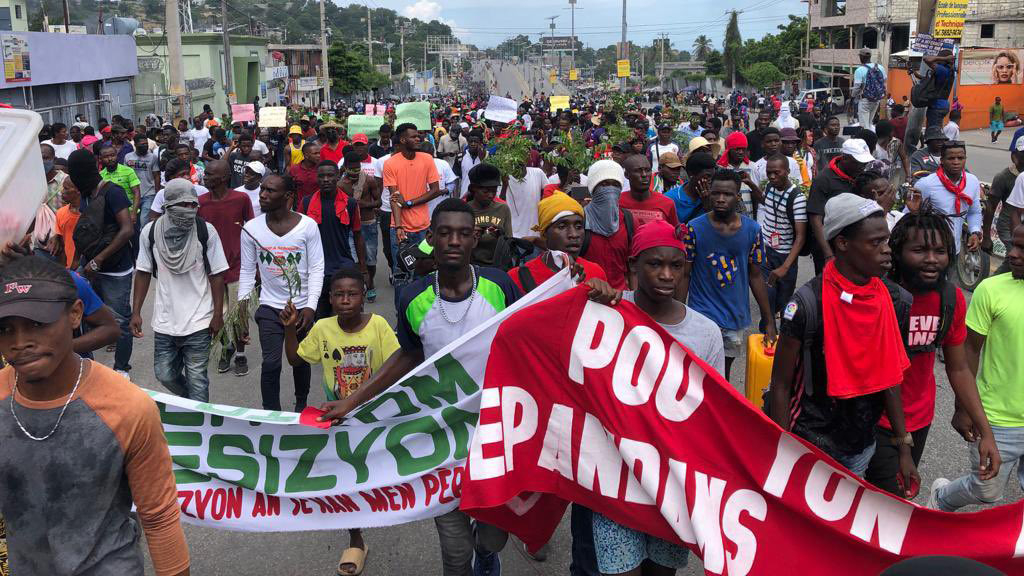On Monday, August 22, thousands of Haitians took to the streets across the country to protest against rampant insecurity, chronic gang violence and a rising cost of living. The protesters demanded the resignation of Prime Minister and acting President Ariel Henry, arguing that under his management, the economic and social crisis deepened in the Caribbean country.
In the capital of Port-au-Prince, members of several civil society organizations, popular movements, trade unions, and opposition parties held a massive rally, condemning fuel shortages and soaring prices of essential commodities and basic services. Protesters blocked roads with burning tires in and around the capital. Haiti’s central bank reported that inflation had reached 29% and hit a 10-year high.
In Cap-Haïtien, citizens held sit-ins outside banking institutions to reject the devaluation of the national currency, the Haitian Gourde, against the USD, which has lost almost 40% of its value so far this year. Hundreds of people mobilized in the streets criticizing the Henry administration’s inability to combat insecurity or create the conditions necessary to hold elections. They also condemned the international community, especially the US, the UN, the OAS and the Core group for installing a puppet government in Haiti and continuing their interference in the country’s internal affairs.
The protest actions in Cap-Haïtien were called by former senator and former presidential candidate Jean Charles Moïse, leader of the left-wing Platfòm Pitit Desalin party, who recently withdrew his support for the Henry government. Last week, Moïse and various other political leaders withdrew from the political agreement signed last September to find solutions to the crisis facing the country following the assassination of President Jovenel Moïse. They argued that the ruling right-wing Haitian Tèt Kale Party (PHTK) party has no interest in solving the real problems of Haiti, or organizing the elections before the end of this year, as it promised last year. They also condemned the opposition Democratic and Popular Sector (SDP) and the Fusion of Haitian Social Democrats parties for supporting the Henry government.
Demonstrations and marches took place in other major cities such as Petit-Goâve, Miragoâne, Les Cayes and Jacmel against widespread insecurity, political instability and the cost of living crisis.
Jodi an se premye gwo jounen manifestasyon nan plizyè gwo vil peyi an nan plis pase yon lane. Se premye fwa kowalisyon ki sou pouvwa a pral oblije reponn ak presyon popilè. Ensekirite, enflasyon, chomaj tout bagay vin pi mal pandan kowalisyon sa a sou pouvwa a. #Haiti pic.twitter.com/ZBaXx0JjTI
— ED (@EtantDupain) August 22, 2022
The mobilizations coincided with the 231st anniversary of the 1791 slave uprising that triggered a long struggle for Haiti’s independence from France in 1804. The demonstrators marched on the streets chanting slogans, such as “rise up for another independence”.
The authorities responded to these social protests with violent repression. In Port-au-Prince, the police shot tear gas at protesters in an attempt to disperse them from the Delmas 40 highway. A group of armed supporters of the Henry government then opened fire on protesters at Delmas 38. According to the Platform for National Mobilization, at least two people were killed and several were injured.
According to reports from Radio Resistance, on Tuesday, August 23, members of various social organizations and trade unions organized a sit-in outside the Ministry of Commerce and Industry to denounce the situation. They also demanded the resignation of trade minister Ricarden Saint Jean.
Since 2018, Haiti has been going through an acute social, political, institutional and economic crisis. The situation has worsened since the assassination of Haiti’s de facto president Moïse in July 2021. Following his assassination, armed gangs have been increasingly seizing control of the national territory.
The government has repeatedly claimed that it needs support to arm the police against the criminal gangs. However, civil society organizations and popular movements have claimed the government and the police collaborate with the gangs in looting the citizens and public resources.
According to the UN report in February, kidnappings have increased by 180% in 2021 compared to the previous year. The battles between rival gangs have left hundreds dead and thousands displaced. Serious incidents of sexual violence against women and girls, as well as boys being recruited by gangs, have also been reported.
According to a recent report by the UN’s Office for the Coordination of Humanitarian Affairs, nearly 1.5 million people are trapped in gang-controlled neighborhoods only in the Port-au-Prince metropolitan area. The agency warned that conditions are worsening as growing violence is keeping people and children from nutritious food, drinking water and adequate health care.
The World Food Program says nearly half of Haiti’s population, some 4.4 million people, are going hungry and need lifesaving assistance.
#Haiti's capital, Port-au-Prince, is dominated by vicious gangs supplied with heavy weapons imported from the U.S. But #Haitians are protesting anyway, risking their lives. Any shame, @USEmbassyHaiti, for supporting the repressive regime? @madanboukman @jmakala @AmbDanFoote https://t.co/9yd9YyC7MN
— James North (@jamesnorth7) August 22, 2022





